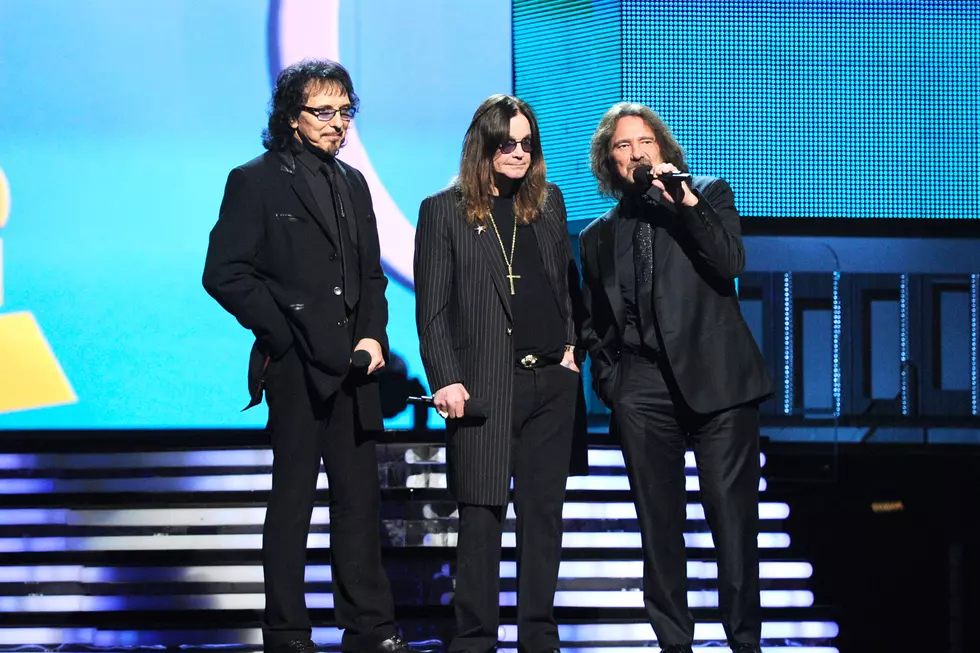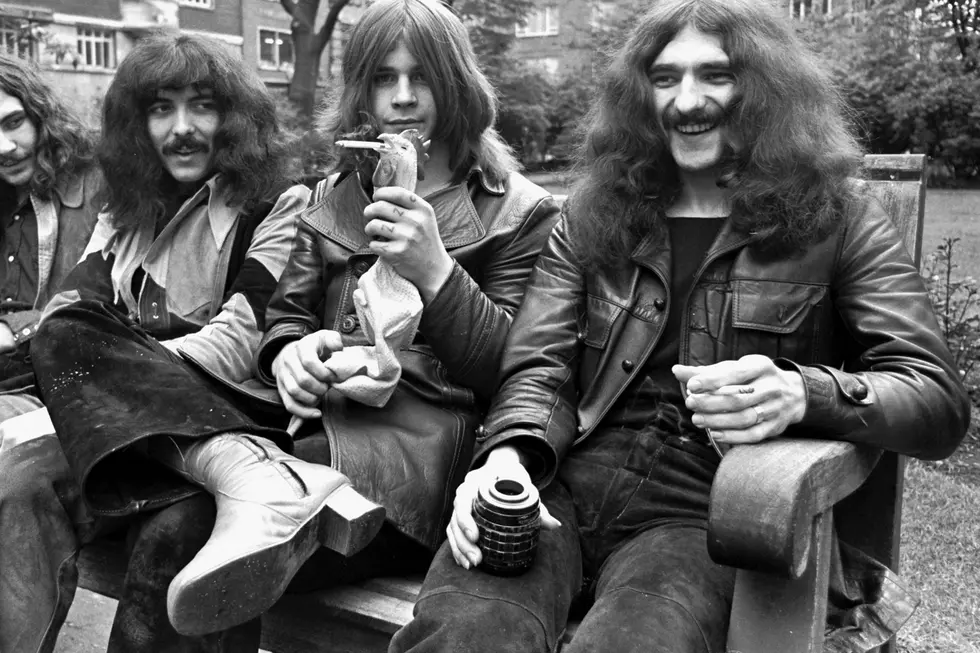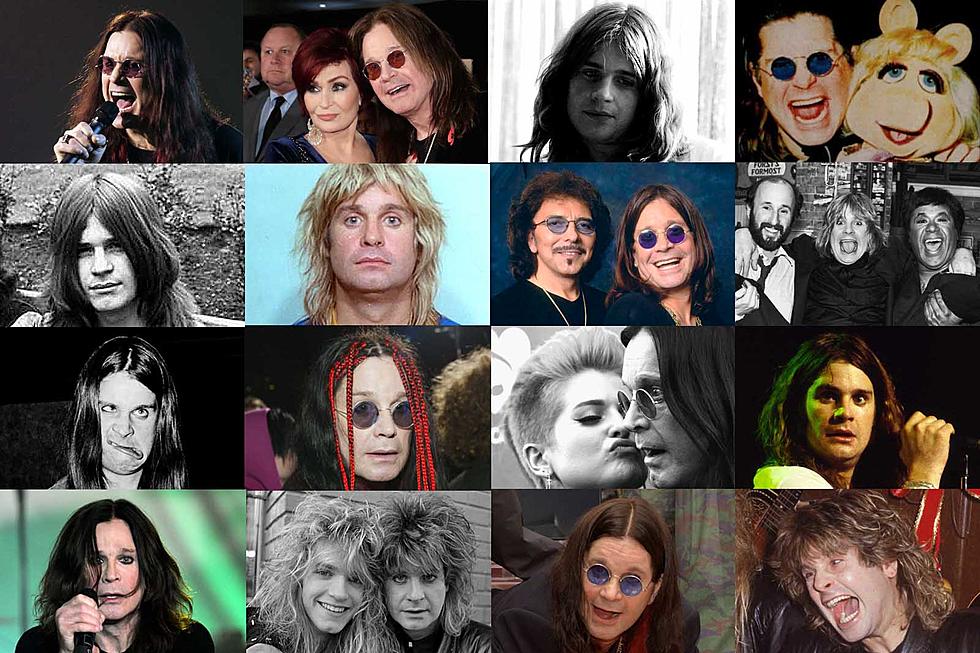
Why Black Sabbath Decided Not to Record a Blues Album
It's not hard to find elements of the blues in Black Sabbath's music. Turns out, they once had thoughts about doing an entire album dedicated to the genre.
Then continuing health issues sent their plans in a different direction. That's one of the many revelations to be discovered with Into the Void, the new memoir from bassist Geezer Butler.
Black Sabbath had just wrapped up a series of tour dates in 2014 when the idea surfaced. Guitarist Tony Iommi's lymphoma had been discovered in 2012, however, and the band decided to remain on the road. "We thought we better put any recording on hold and fit one last tour in – while he was able," Butler wrote, regarding The End tour which followed.
Butler shed more light on this period during a conversation with UCR, while also discussing unreleased music from Black Sabbath and memories of Eddie Van Halen and Cream's Jack Bruce.
In your book, you write about how after the tour in 2014, there was a thought about doing a blues album. I'm guessing it never got past the concept stage.
No, because we didn’t know what was going to happen with Tony. He was really ill at the time. We just thought, “We don’t know what’s going to happen, so let’s just do the final Sabbath tour. If everybody is still alive after that, we’ll look at doing another album, but it really took it out of Tony. I just don’t know how he did it. When we were writing the 13 album, he was having chemotherapy and then coming back from the hospital and carrying on writing. Me and Ozzy [Osbourne] were going, “Tony, just have a rest!” He just wouldn’t do it. He refused to rest. He wouldn’t let it beat him. The final tour was originally going to be 100 gigs, and we were supposed to finish in Japan, but halfway through, Tony just said: “I can’t do 100.” We said, “Fair enough.” We were lucky to get 80 gigs on the final tour, you know, so we all understood. That was it. But as far as the blues album, I think that Tony’s still doing stuff in his studio. In fact, he emailed me last week and said, “Do you fancy doing some bass playing?” [Laughs] I went, “Maybe!” But no, there’s nothing in concrete. If something happens, it will happen – but I wouldn’t hold your breath.
How much is there in the vaults from the later years that we haven't heard? "Scary Dreams" from the early 2000s is one song that comes to mind.
Well, if you haven’t heard them, then they’re not good enough to go on the record. I mean, “Scary Dreams,” you know, it wasn’t great. That was when we were trying to throw an album together, I think it was in 2001. It just wasn’t working. It just felt really forced. “Scary Dreams” is probably the best we came out with. I was so disinterested in it that I didn’t want to write the lyrics or anything. Geoff Nichols, the keyboard player, came out with the vocal line and the lyrics. [Laughs] That’s how disinterested everybody was. It was just too forced. We had about five or six songs and I didn’t really like them, but I just went along with it for Tony and Ozzy’s sake. We went to play them to Rick Rubin and I just thought, “God, these are really crap.” I think Tony and Ozzy might have liked them, but they just weren’t up to scratch. I didn’t think so. The four of us have to like something for it to be good. It can’t just be two of us, so that’s as far as it went.
Looking at albums from the Sabbath catalog, 1992's Dehumanizer is underrated. What are the memories that stay with you from that period?
It was great to get back with Ronnie [James Dio] again. After all of the horrible things that happened between us, we’d sort of grown up a little bit by then. We were a little bit more mature and could talk about stuff. On that album, I was actually presenting stuff that I was writing to Tony and Ronnie, which I hadn’t really done before. I’d been doing my own stuff. I wrote lots and lots of solo stuff, but I had quite a lot of things written that I thought were suitable for the band. I felt more a part of the band, being able to bring my stuff that I was writing to them – whether or not they liked it. But quite a bit of it was used on the album, so I was really happy doing that album.
Watch Black Sabbath's 'TV Crimes' Video
You mention Jack Bruce of Cream in the acknowledgments for your book. How much did you get a chance to know him?
I didn’t know him. I’d met him a couple of times and I was just too in awe of him, to be honest. It’s like meeting Jesus or something. [Laughs] When I met Paul McCartney, I didn’t know what to say to him. You meet your hero and I was tongue-tied. But I just love what Jack did on bass. I’ll always remember going to the club – I’d seen Cream twice before, but I’d only taken notice of Eric Clapton. The third time I saw them, I was standing in front of Jack Bruce and I was just mesmerized at what he was doing. I realized why they didn’t need a rhythm guitarist because he was doing the bass parts and filling in what you’d play on rhythm and it was just amazing to watch. That was it. I thought, “That’s what I want to do.”
What do you think that did for you eventually, as a player?
It gave me a focus. Up until then, I really didn’t think about bass players. I always thought of Paul McCartney as a singer and I didn’t really pay that much attention to his bass playing, even though it was incredible. I didn’t think, “Oh, Paul McCartney is a brilliant bass player.” It wasn’t until I saw Jack Bruce that I saw what a bass player could do. It was like a challenge to me. “That’s what I want to do. I don’t want to play rhythm guitar anymore. I want to play bass.” It was the foundation for my bass playing.
Jack and Ginger Baker were an underrated rhythm section. Before you even get to the playing, they were just fun to watch.
Oh, they were amazing. Ginger Baker looked like he was out of his brains permanently and he was doing these amazing drum fills, double bass stuff and everything. Jack Bruce, I mean, not only was he an incredible bass player, but he was the main singer as well – which is even more mesmerizing.
What is one of your favorite memories of Eddie Van Halen?
Apart from the [1978] tour, it was great when he came down to rehearsals [much later]. Van Halen were playing in Birmingham and me and Tony were rehearsing about 10 miles away from where they were playing. Eddie came down to rehearsal and we had a jam. He co-wrote one of the songs ["Evil Eye," from 1994's Cross Purposes], but we couldn’t use his name, because of publishing agreements and everything like that. Warner Bros. wouldn’t let him or something. I don’t know what happened. So we couldn’t have him as a co-writer, but he was fine with it and said, “Yeah, just do it.” He’s a great bloke. I really liked Eddie.
Going back to that 1978 tour, what was interesting to you, when it came to watching Eddie play?
Nobody played guitar like that until Eddie did it. At first, I thought they were just a normal rock band. You don’t go out and watch them the first night or anything like that. Then, this one night we were in a bigger venue. So I had the chance to go out and watch their set properly. I was amazed at what he was doing, all of the stuff that nobody else was doing at the time. Tony is very hard to impress [when it comes to] other guitarists. He was going, “God, have you seen what Eddie Van Halen can do?” I was like, “Bloody hell, if Tony likes him, he’s got to be a genius!”
Weird Facts About Rock's Most Famous Album Covers
10 Most Important Dio Historical Moments
More From Ultimate Classic Rock









